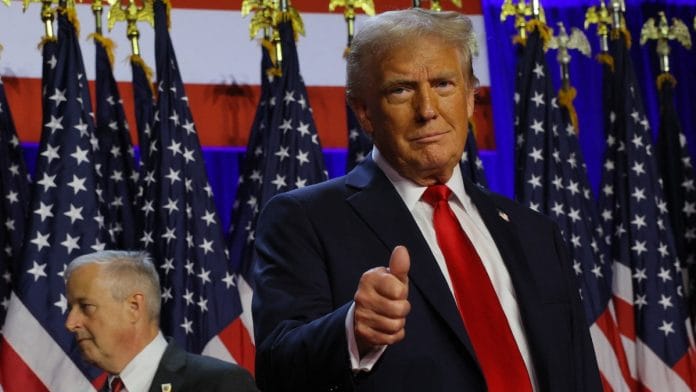Thank you dear subscribers, we are overwhelmed with your response.
Your Turn is a unique section from ThePrint featuring points of view from its subscribers. If you are a subscriber, have a point of view, please send it to us. If not, do subscribe here: https://theprint.in/subscribe/
Donald J. Trump returned as President-elect of the United States of America riding on a hitherto dormant tsunami of support among all sections and demographics of the US electorate. Once again, the polls and pundits got it wrong who had predicted a tight race. One highly regarded pollster saw an unusual shift in favour of Kamala Harris, the Democratic nominee, in an unlikely place, Iowa, a consistently Red State. In the end it proved to be an unprecedented historical comeback in American history.
While Trump supporters are justifiably celebrating the President elect’s electoral victory his detractors have already started expressing serious apprehensions and misgivings about the implications of his second term given that both his domestic and foreign policies are viewed by many experts as extreme and isolationist. They fear that his policy shifts domestically will prove to be divisive, and his foreign policy will exacerbate international tensions and conflicts.
Trump’s past tariffs, sanctions, and blame on China for the COVID-19 pandemic created significant friction. A renewed Trump presidency may lead to intensified economic and military posturing in the Asia-Pacific region. The U.S. stance on Taiwan is especially critical, with Trump’s support for arms sales and diplomatic ties potentially provoking a stronger Chinese response.
Although Trump sought warmer relations with Russia in the past, his lack of support for traditional diplomatic pathways could lead to missteps. This might destabilize Europe, particularly if Trump pursues an “America First” approach that deprioritizes NATO, possibly emboldening Russia’s actions in Eastern Europe.
Trump’s withdrawal from the Iran nuclear deal in 2018 created a volatile situation that could re-escalate if sanctions and punitive measures return. If Trump further pressures Iran without a diplomatic fallback, the risk of armed conflict could rise, affecting not only regional stability but also global oil markets and security.
Trump has historically questioned the value of international alliances and agreements, often expressing a preference for unilateral action. This stance could impact the efficacy of organizations like NATO, the UN, and the EU in addressing global security concerns.
In areas requiring global cooperation—such as climate policy, conflict resolution, and pandemic responses—U.S. disengagement under Trump might weaken international response efforts, leaving power vacuums that could be filled by rival states or lead to unchecked regional instability.
Trump’s policy shifts have often tested U.S. alliances, especially with NATO partners. Allies wary of the U.S.’s commitment to shared defence may seek alternative partnerships or invest more in self-defence, leading to a more militarized world landscape. If Europe starts to distance itself, it could erode NATO’s influence and reduce the unity of Western powers. Additionally, allies in the Asia-Pacific, such as Japan and South Korea, might feel compelled to bolster their defence budgets, contributing to a regional arms race if they perceive the U.S. as an unreliable partner.
The U.S. has historically led efforts to limit nuclear proliferation, but Trump’s approach might deprioritize or dismantle international agreements, such as the New START treaty with Russia. This could lead to an arms buildup if countries pursue nuclear advancements unchecked.
Trump’s robust military spending and emphasis on national defence could enhance deterrence, especially against aggressive actions by Russia or China. A strong U.S. military presence might help reassure allies and prevent rival powers from overstepping, which could contribute to stability in areas like the South China Sea and Eastern Europe. The potential deployment of more defence assets in critical regions could strengthen defence postures in Taiwan, South Korea, and Eastern European states, dissuading potential adversaries from considering hostile actions.
Trump’s support for Israel, Saudi Arabia, and India reflects his tendency to strengthen key bilateral alliances that prioritize stability in regions prone to conflict. These relationships could bolster regional security and contribute to countering terrorism and instability. In South Asia, a focus on strategic alliances with India could help counterbalance China’s influence. This partnership might benefit both nations in terms of defence technology sharing and intelligence collaboration, supporting regional stability.
Trump’s strong stance on counter-terrorism, demonstrated by operations targeting ISIS and al-Qaeda leaders, suggests he would prioritize preventing terrorism globally. Increased intelligence collaboration with allied nations could lead to more successful counter-terrorism efforts in Africa, the Middle East, and Southeast Asia. By focusing on dismantling terror networks and restricting their financing, Trump’s administration might contribute to a reduction in terrorism-related threats worldwide, thus enhancing global security.
A Trump presidency would likely lead to a complex mix of both stabilizing and destabilizing influences on world peace. His emphasis on national defence, security alliances, and counter-terrorism could enhance stability in areas vulnerable to terrorism and conflict. However, his sceptical view of multilateral cooperation and assertive approach toward rivals like China and Iran might increase tensions and limit avenues for peaceful resolution.
While Trump’s approach may strengthen deterrence in some regions, it could simultaneously create diplomatic voids that other global powers might exploit, complicating the pursuit of world peace. Ultimately, the international response to Trump’s policies will play a decisive role in determining their impact on global stability.
(The author is Mufti Showkat Farooqi, Attorney at Law, New York. Views are personal.)
These pieces are being published as they have been received – they have not been edited/fact-checked by ThePrint


